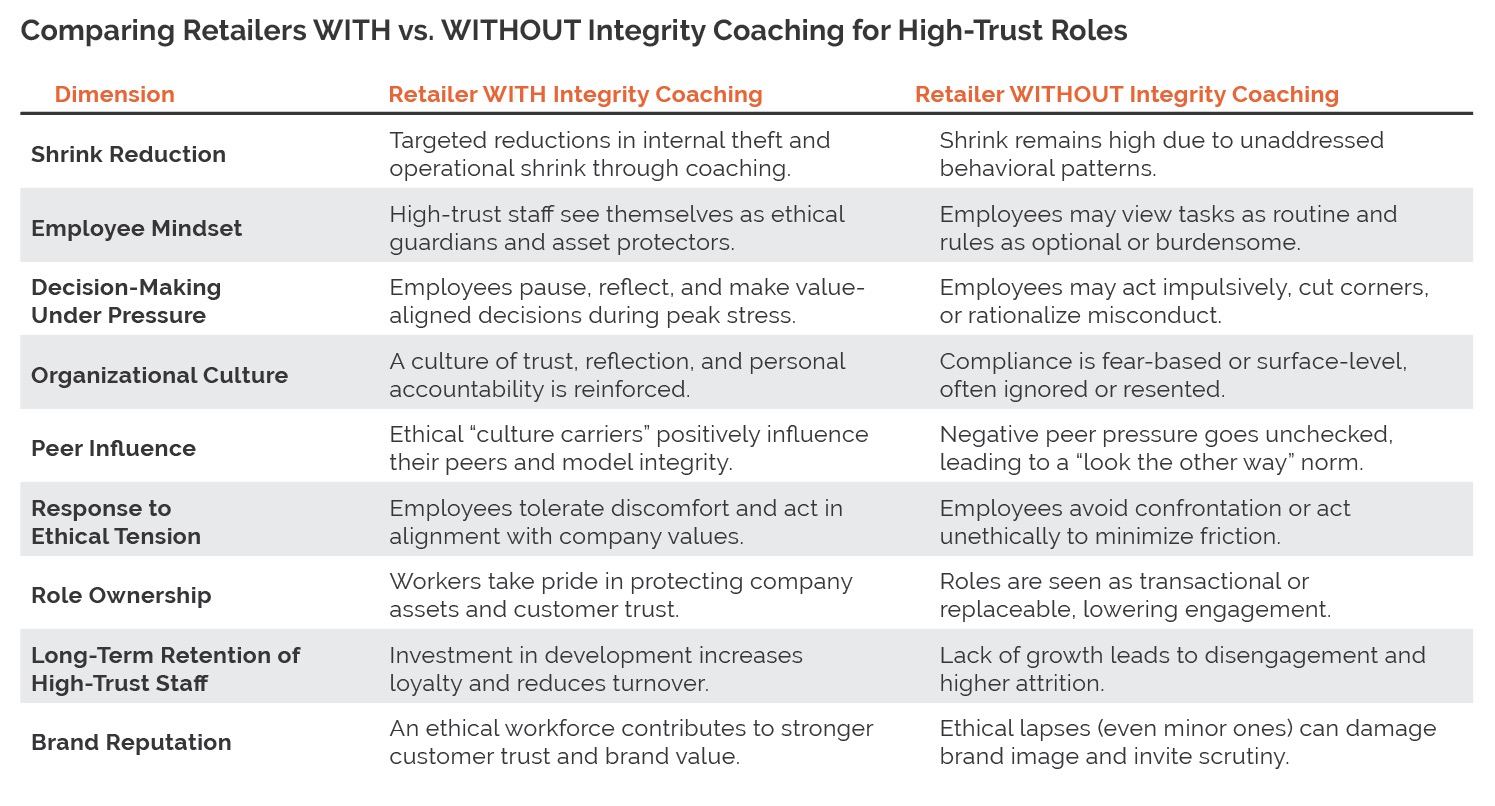I’ve spent more than two decades helping organizations build high-integrity workplaces, and over that time, one truth has become painfully clear: very few companies actively develop the integrity mindset of their current employees, especially among frontline workers in retail and service environments. These employees are often the public face of the organization, handling money, managing customer relationships, and navigating pressure-filled decisions daily. And yet, most efforts to support ethical behavior—if they exist at all—are focused almost exclusively on managers, executives, and select professionals.
Even when coaching programs are available, they rarely trickle down to the individuals most exposed to ethical risk. And perhaps most frustrating of all, professionals lack a succinct, research-informed coaching model designed specifically to build integrity and ethical self-regulation among non-managerial staff.
That’s why I’ve turned to the Acceptance and Commitment Therapy (ACT) model—a framework I’ve worked with in both therapeutic and coaching settings. ACT has been validated through hundreds of peer-reviewed studies for improving emotional resilience, values-based behavior, and decision-making under pressure. While originally developed for clinical populations, its potential for workplace integrity coaching is immense—but largely untapped.
This article is a first baby step toward bridging that gap. My goal is to introduce a coaching model rooted in ACT that can help cultivate dependable, ethical, and high integrity behavior among frontline employees who often need it most—and who too often get left behind in workplace coaching and development conversations. A significant factor contributing to this challenge is the absence of structured coaching programs aimed at cultivating high ethics and integrity among frontline employees. While leadership development often emphasizes ethical behavior, the rank-and-file staff—who represent the organization’s core operations—frequently lack access to such developmental initiatives.
What Research Tells Us: Ethical Development at the Frontline
Although studies in this area are limited, several noteworthy findings underscore the impact of ethical coaching and leadership on employee behavior:
- Ethical leadership contributes to better employee performance by fostering a culture of accountability, care, and organizational virtuousness—especially in high-pressure, customer-facing roles.
- Ethical workplace climates reduce emotional exhaustion and enhance well-being among frontline service employees, improving resilience and job satisfaction.
- Ethics training is more impactful when it includes personal reflection, open dialogue, and practical relevance—rather than focusing solely on compliance and rule enforcement.
- Employee attitudes toward ethics and integrity are reliable predictors of workplace behavior and performance, especially in high-trust and emotionally demanding roles.
These studies affirm what many LP professionals already sense: true ethical behavior flourishes in environments where ethical leadership and structured development practices are embedded into the daily culture. Proactive Integrity Coaching provides a roadmap for doing just that (see Table 1).

The Psychological Foundation: ACT and the Science of Coaching for Integrity
ACT, developed by Dr. Steven C. Hayes and colleagues, is a behavioral science model originally created to treat psychological inflexibility and distress. Over time, it has evolved into a robust framework for workplace coaching and personal development, especially in high pressure environments like retail and service sectors. ACT centers around six psychological processes, often depicted as the “hexaflex”:
1. Values Clarification: Identifying what truly matters to you at work and in life. In integrity coaching, this helps employees define and align their daily actions with personal and organizational ethical standards.
2. Focused Presence: Bringing full attention to what’s happening right now without judgment. This allows employees to slow down during high-stakes moments and make deliberate, ethical decisions rather than reactive ones.
3. Thought Clarity: Learning to observe thoughts without automatically believing or obeying them. This skill is crucial for challenging internal justifications, such as “everyone does it,” which often lead to misconduct.
4. Emotional Resilience: Willingly experiencing uncomfortable feelings or urges without avoiding them. Ethical decisions often involve discomfort (e.g., reporting a peer). Emotional resilience empowers employees to act ethically despite inner tension.
5. Integrity Identity: Viewing yourself as more than your current emotions or roles; acting from a stable, high integrity sense of self. When employees identify as “someone who leads with integrity,” their behavior becomes more consistent and values-driven.
6. Values Execution: Taking deliberate, repeated steps guided by values, even when it’s difficult. Integrity becomes real through daily behavior. This dimension builds ethical habits that stick over time.
Together, these six processes create psychological flexibility—the ability to act in accordance with your values even when under stress. That, in essence, is the core of workplace integrity. Coaching employees to build these six skills equips them to consistently make ethical choices, resist rationalizations, and stay grounded in values during the inevitable pressures of the workday.
While originally used in mental health treatment, ACT has rapidly expanded into organizational, leadership, and coaching contexts because of its powerful application to behavior change, emotional regulation, and performance under pressure. These same processes can be harnessed to coach integrity in the workplace.
Proactive Integrity Coaching: The Six Dimensions in Action
As a licensed psychologist and coach, I have successfully integrated ACT into telehealth therapy and coaching with clients. What makes ACT particularly suitable for coaching ethics is its focus on psychological flexibility—the ability to stay true to values even in the presence of discomfort, temptation, or stress. This, at its core, is what integrity demands. This section illustrates how the six dimensions of ACT appear in coaching practice.
1. Clarifying Values in Real Time
Ethical behavior begins with clarity—knowing one’s personal values and aligning them with the company’s mission. Employees who cannot articulate what matters most to them are more likely to drift into ambiguity when confronted with ethical tension.
LP professionals can help employees explore questions such as:
- “What do you want to stand for in your role?”
- “When are you the proudest of how you handled a tough situation?”
A cashier once rationalized giving discounts to friends as a harmless favor. After exploring his value of fairness, he came to see the behavior as violating both personal and organizational integrity.
2. Slowing Down to Stay Ethical
Retail and service jobs often move at a relentless pace. Employees who lack a focused presence and a sense of mindfulness can become reactive, leading to impulsive decisions. Mindfulness creates ethical space. An LP leader might introduce the “One Breath Rule” before issuing refunds or handling disputes, helping employees pause and reflect: “Is this honest? Is this fair? Is this aligned with our mission?”
3. Clarifying Thoughts Before They Become Behavior
Thought clarity teaches employees to spot and detach from the internal justifications that often precede unethical conduct:
- “Everyone does it.”
- “I’m underpaid, so this is fair.”
- “They owe me.”
When employees see these as just thoughts—not immutable facts—they regain the power to resist them and choose ethical responses.
4. Tolerating Discomfort Without Ethical Compromise
Doing the right thing often brings discomfort. ACT teaches that discomfort is not a signal to avoid—it’s a sign of doing something meaningful. Emotional resilience and acceptance coaching helps employees lean into the anxiety of reporting theft or admitting a mistake.
One team leader who delayed confronting a peer about inventory fraud finally acted after practicing acceptance-based coping: “This is hard, but I can do hard things.”
5. Ethical Identity as a Guide
Rather than seeing themselves as passive workers, ACT helps employees adopt a larger job-related self-concept: “I am someone who acts with integrity.” This identity shift becomes a behavioral compass.
One self-checkout attendant reframed herself as “a guardian of trust and fairness,” transforming how she handled customer irregularities and peer accountability.
6. Building Ethical Habits
Finally, insight without action is wasted. Proactive Integrity Coaching ends with
micro-commitments: specific, values-driven actions employees can take immediately.
Examples:
- “I will pause before issuing a refund.”
- “I will report one example of ethical behavior I saw today.”
- “I will write down one situation I handled in alignment with my values.”
Over time, these actions hardwire ethical habits into one’s repertoire while positively influencing workplace culture.
Not All Employees Are Alike: Integrity Coaching for High-Trust Roles
While Proactive Integrity Coaching can benefit any employee, it is especially critical for those in positions that oversee high value assets or control processes vulnerable to misconduct. These high trust roles often involve access to merchandise, financial instruments, sensitive data, or customer property—making even small ethical lapses potentially costly. Examples of roles where integrity coaching is particularly vital include:
Receiving clerks and warehouse associates who manage incoming inventory and can influence shrink rates through accurate (or inaccurate) processing.
- Self-checkout attendants who supervise high risk transactions with limited oversight.
- Cashiers and front-end supervisors with direct access to company funds and high customer interaction.
- Returns and refund specialists who may be targeted by opportunistic fraud or tempted to cut corners under pressure.
- LP staff, whose credibility and vigilance are foundational to company-wide integrity.
- Store or department managers who set the ethical tone and supervise policy enforcement across teams.
Because these roles operate at critical trust points within the organization, they warrant proactive development—not just reactive correction. Proactive Integrity Coaching provides these employees with the psychological tools to navigate ethical tensions, resist rationalizations, and remain steady when pressure mounts.
However, not all employees may be immediately coachable. Some may have a history of repeated, willful misconduct or exhibit a lack of openness to reflection or growth. For these individuals, coaching may need to be postponed until accountability is reestablished through disciplinary or corrective measures. In short, integrity coaching is not just a general development strategy—it is a high-value investment in roles where ethical consistency protects assets, reputation, and trust.
Implementation Roadmap: Bringing Integrity to Life
What might individual or group integrity coaching processes look like? At a minimum, the following six-step roadmap would serve as a useful coaching intervention.
1. Use an Integrity Self-Assessment (find it on p. 36 of the digital edition).
- Begin coaching by identifying employee strengths and gaps across the six ACT domains.
2. Personalize Integrity Coaching Plans.
- Address the lowest scoring employees first using one-on-one coaching, peer discussion, and structured reflection. Prioritize high trust roles.
3. Conduct weekly integrity check-Ins.
- Use short five-minute meetings to review ethical micro-commitments and reinforce alignment with values.
4. Normalize discomfort.
- Help employees understand that ethical discomfort is natural—and often signals growth.
5. Use group-based microtraining.
Facilitate ten-minute group coaching sessions periodically focused on one ACT domain per month.
6. Scale with recognition.
- Celebrate acts of integrity in team meetings, leaderboards, and internal communications.
Case Study: Coaching Integrity and Emotional Resilience in a High Trust Role
Case anonymized and shared with permission. Details have been altered to protect confidentiality.
As someone committed to building high integrity workplace cultures, I had the opportunity to work with a client whose case highlighted the transformative potential of Proactive Integrity Coaching. The client was a shift manager at a community-based alternative living home—a role involving significant trust, responsibility, and emotional labor.
At the time of our engagement, the employee was a daily, heavy cannabis user and had begun exhibiting very subtle verbal aggression toward coworkers and residents. Notably, he lived in a state where cannabis use is legal, but his usage had escalated to the point of affecting his workplace behavior, decision making, and professional presence. His conscientiousness and emotional stability scores—based on a job-relevant personality assessment and observation—were notably low. He was overwhelmed, reactive, and increasingly disconnected from the ethical expectations of his role. Key elements of this coaching engagement included the following:
Step 1: Identify Integrity Gaps
The assessment served as a conversation starter. We explored how his current work behavior—particularly when under the influence or under pressure—was misaligned with both his personal values and professional responsibilities. He said that he wanted to be better.
Step 2: Personalize the Coaching Plan
Given the seriousness of his role and behavior, we prioritized one-on-one integrity coaching with a strong emphasis on self-regulation. His personalized coaching plan focused on:
- Attending Marijuana Anonymous (MA) meetings to address substance use.
- Developing mindful awareness of emotional triggers.
- Practicing brief reflection before responding to staff or residents.
- Being open to a referral for clinical psychotherapy if warranted.
Step 3: Weekly Integrity Check-Ins
Early on we met weekly for 45-minute coaching sessions, during which he set and reported on micro-commitments. Examples included:
- “I will remain calm during my next staff conflict.”
- “I will write down one way I aligned with my values today.”
- “I will commit to MA meetings as I strive to go cannabis free.”
Step 4: Normalize Discomfort
He initially struggled with the vulnerability of being seen as “the problem.” We reframed discomfort as a natural part of ethical growth—a sign of integrity in action, not failure.
Step 5: Reinforcement Through MA
In addition to our coaching sessions, the client began regularly attending Marijuana Anonymous meetings as part of his personalized coaching plan. These voluntary meetings offered a structured, supportive environment that reinforced many of the same principles introduced in Proactive Integrity Coaching—including personal responsibility, values-based reflection, and emotional self-regulation. Parenthetically, MA attendance was the client’s idea.
Of particular relevance were the steps in the MA program that paralleled the coaching emphasis on emotional resilience, integrity identity, and values clarification, giving the client an opportunity to confront his counterproductive behavior with honesty, reflect on its impact, and develop a more ethical identity. The peer accountability and lived experience shared in MA became a valuable extension of his workplace coaching—helping to reduce shame, normalize struggle, and provide practical tools for long-term behavioral change.
Step 6: Scale with Recognition
As his aggression diminished and self-awareness increased, his name began to appear more frequently for positive workplace contributions. He was recognized for modeling compassion, taking initiative with conflict resolution, and showing up clear headed for work consistently.
Positive Outcomes
Within eight weeks of coaching:
- No further incidents of aggression were reported.
- He consistently attended MA meetings and significantly reduced his cannabis use.
- His relationship with staff and residents improved, as did team morale.
- He began mentoring another employee in a similar role, sharing mindfulness techniques and check-in tools.
Expanding the Toolkit: The Five Ethical Precepts
While ACT lays the foundation for internal psychological flexibility, Proactive Integrity Coaching is further strengthened by integrating Five Ethical Precepts—adapted through the lens of mindfulness psychology and reframed for workplace relevance. These precepts serve as behavioral anchors for workplace behaviors—providing clarity and structure for ethical conduct at work where ambiguity and pressure often cloud judgment. Each precept applies to desired workplace behaviors.
- Abstain from Harm: Maintain a respectful and inclusive work environment by avoiding bullying, harassment, verbal abuse, or behaviors that isolate or demean others
- Abstain from Taking What Is Not Given: Demonstrate workplace honesty by rejecting theft, misuse of company time, falsified hours, or unauthorized discounts and perks.
- Abstain from False Speech: Foster trust and transparency by avoiding dishonesty, gossip, misinformation, or misleading communication in professional interactions.
- Abstain from Intoxicants: Ensure safety, reliability, and sound judgment on the job by remaining sober and mentally clear during work hours.
- Abstain from Power Abuse: Uphold fairness and ethical leadership by avoiding manipulation of coworkers, exploitation of authority, or bending policies for personal advantage.
Rooted in the principles of mindfulness psychology, these precepts are not imposed from above but integrated from within. A coach can use these precepts to encourage employees to bring deliberate attention and ethical intention to their behavior, moment by moment. When paired with ACT’s six psychological processes—such as values clarification, defusion, and committed action—these behavioral boundaries transform into daily practices of integrity.
This combined model is what makes Proactive Integrity Coaching unique: it equips employees with both inner awareness tools and outer ethical boundaries. The ACT model fosters psychological flexibility, while the precepts ensure that flexibility bends toward behavior that is consistent, accountable, and trustworthy. In a world where compliance is not enough, this dual approach creates not just rule followers, but reflective, principled professionals who are ready to lead by example.
Final Word: From LP to Character Cultivation
LP is evolving. It’s no longer just about deterring dishonest behavior—it’s about cultivating character. The Proactive Integrity Coaching model, even in a conceptual stage of development, provides a deeply practical, psychologically robust method for developing ethical behavior at scale. When employees are coached to clarify values, diffuse rationalizations, embrace discomfort, and act from an ethical identity, they don’t just comply with rules—they commit to them.
Ethical excellence isn’t trained; it’s coached—through conversation, reflection, and courage. As organizations face rising shrinkage, increased scrutiny, and the ethical challenges of the post-pandemic economy, Proactive Integrity Coaching offers a modern roadmap rooted in psychological science. Let’s stop waiting for ethics to emerge by chance. Let’s coach it—intentionally.
 John W. Jones, PhD, is the Executive Vice President of R&D and Professional Certification Services at FifthTheory, LLC. Dr. Jones is a Licensed Psychologist in Illinois where he provides clinical mental health counseling and business consulting services. He has more than thirty years of experience in loss prevention psychology and is the principal thought leader for FifthTheory’s Psychology-Informed Loss Prevention Professional (PI-LPP) certification program. His current areas of research include the psychology of workplace violence and incivility, employee theft and collusion, on-the-job illicit drug use, trauma-informed leadership, and teletherapy-based EAP services.
John W. Jones, PhD, is the Executive Vice President of R&D and Professional Certification Services at FifthTheory, LLC. Dr. Jones is a Licensed Psychologist in Illinois where he provides clinical mental health counseling and business consulting services. He has more than thirty years of experience in loss prevention psychology and is the principal thought leader for FifthTheory’s Psychology-Informed Loss Prevention Professional (PI-LPP) certification program. His current areas of research include the psychology of workplace violence and incivility, employee theft and collusion, on-the-job illicit drug use, trauma-informed leadership, and teletherapy-based EAP services.


